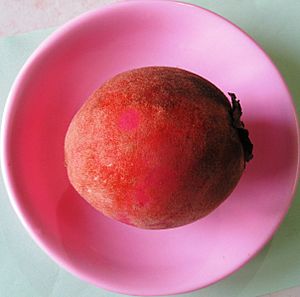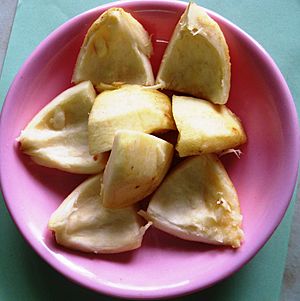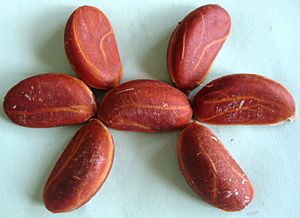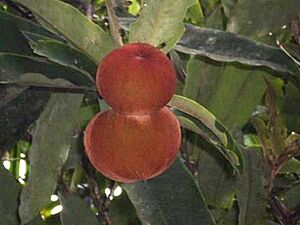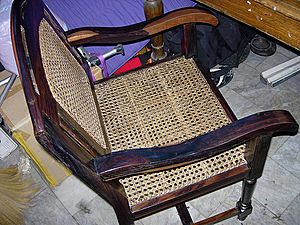Velvet apple facts for kids
Quick facts for kids Velvet apple |
|
|---|---|
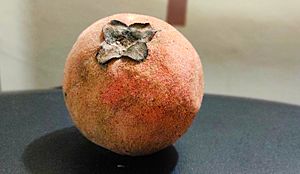 |
|
| A velvet apple | |
| Scientific classification |
|
| Kingdom: | Plantae |
| Clade: | Tracheophytes |
| Clade: | Angiosperms |
| Clade: | Eudicots |
| Clade: | Asterids |
| Order: | Ericales |
| Family: | Ebenaceae |
| Genus: | Diospyros |
| Species: |
D. blancoi
|
| Binomial name | |
| Diospyros blancoi A.DC.
|
|
| Script error: The function "autoWithCaption" does not exist. | |
| Synonyms | |
|
|
Script error: No such module "Check for conflicting parameters".
The Velvet Apple (scientific name: Diospyros blancoi) is a cool tree known by many names. You might hear it called the velvet persimmon, kamagong, or mabolo tree. It's related to ebony trees and persimmons.
This tree grows a unique fruit covered in soft, reddish-brown "fur," just like velvet! Inside, the fruit has creamy, pink flesh. Many people say it tastes and smells a lot like peaches.
The velvet apple tree originally comes from the Philippines and parts of Taiwan. But it has also been brought to other warm places. You can find it in Southeast Asia, the Pacific Islands, South Asia, the Caribbean, and Florida.
Contents
Growing Velvet Apple Trees
The velvet apple is a tropical tree that loves warm weather. It can grow in many different types of soil. You can find it growing from sea level up to about 730 meters (2,400 feet) high.
These trees need plenty of rain all year round to grow well. If you plant a tree from a seed, it might take 6 or 7 years to start growing fruit. But if you plant a tree from a cutting (a piece of another tree), it can produce fruit much faster, in just 3 or 4 years. It's a tree that gives a lot of fruit!
Fruit Varieties
Velvet apple fruits can look very different from each other. They come in various shapes, colors, and even how hairy they are. Their taste can also vary a lot. This shows that there's a lot of natural variety in the plants.
Some types of velvet apples don't have seeds. These are very popular because the normal fruits have large seeds that take up a lot of space inside.
Kamagong Wood: Strong and Beautiful
The wood from the velvet apple tree is called Kamagong. Just like other trees in its family, like ebony, Kamagong wood is super strong and very dense. It's famous for its dark color. Because it's so hard, it's sometimes called "iron wood".
People use Kamagong wood for building houses. It's great for floors, posts, doors, and windows. You can also find beautiful furniture and decorations made from this wood. These items can be sent to other countries if they have the right papers.
Kamagong wood is also popular for making tools used in martial arts. For example, it's used to make practice swords called bokkens and sticks for Eskrima, a Filipino martial art.
Protecting the Kamagong Tree
The Kamagong tree is an endangered species. This means there aren't as many of them left as there used to be. Because of this, it's protected by law in the Philippines. It's against the law to send Kamagong wood out of the country without special permission. This rule helps to keep these special trees safe for the future.
 | Audre Lorde |
 | John Berry Meachum |
 | Ferdinand Lee Barnett |


